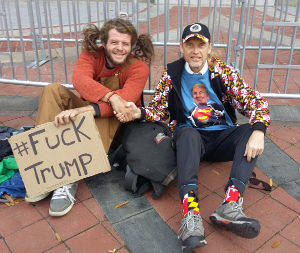Helping Others Through Taxation
-
This notion that because some government program is being reduced or eliminated
tells you "everything you need to know" about them, is just plain wrong.
There are people who actually believe that 9 million children will suddenly be without
the healthcare they need and many of them will die. The use of sick children to demonize
one's political oppenents is itself, sickening.
- There are always (at least) two sides to a story. E.g., I am tired of those
demanding I provide for other people. Yes, I believe in helping the less fortunate -- and I do.
Do we really want the administrations of Trump, Obama, Bush, Clinton, (pick your least favorite)
deciding who should get our "charitable donations"? I am convinced I can do
a much better job making those decisions for myself. How about you?
- The real debate here is the scope and role of the federal government (FG).
Just because there are those who advocate the FG get out of the business
of wealth redistribution, does not imply they are opposed to helping others.
- Without being asked, the FG takes our money and gives it to whomever
they choose, often subsidizing the very behaviors that keep people in poverty,
trapping generations in a lifestyle of mediocrity and dependence.
- Why should we be expected (forced) to pay for other people's housing, food, healthcare, etc.,
which has generated an ever-growing list of needed "services" and number of those needing "assistance"?
Too often, these "services" provide a fish but fail to provide means and incentive for recipients
to fish for themselves.
- Don't misunderstand. I am not advocating heartlessness. Of course, we should be charitable -- BUT
- when the government seizes our money and redistributes it,
whether we think it's beneficial or like it or not, that's tyranny and is insidious.
- when we give our money (time, resources, etc.) to help others, that's charity which is virtuous.
- That's a very important distinction. Let me offer two examples:
- Some government agencies fund organizations like Planned Parenthood, even though
there are those who are very opposed. See the point? One person's "charity" is another
person's "murder" of our most innocent members of society.
- Some government agencies fund organizations like local Rescue Missions, even though
there are those who are very opposed. It is their opinion that government money should
not be used to fund organizations whose mission includes being a "Christ-centered ministry ... driven by the desire to introduce people to Jesus Christ." See the point? One person's "charity"
is another person's messy entanglement among church and state.
- So don't assume that just because the POTUS, Congress, or state or local governments reduce
"services" it means those who do so want people to starve, be homeless, or die from lack of
health care.
- One result of all our do-good-ism (as of September, 2018) is that we now have
$21.5 trillion dollars of federal debt (click here).
- To try to get a handle on how much money that really is, if you take the debt
and divide it by the number of people who pay federal taxes, that comes out to over
$176 thousand per tax payer.
- This level of debt is unsustainable. If we don't turn this ship around,
we will suffer a financial collapse not seen since the Great Depression. I doubt
those who will suffer the consequences will think much of all the do-good-ism
of previous generations.
- To somehow show what good people we are, we continue to spend, spend, spend,
(translation: borrow, borrow, borrow) passing the bill on to OUR children, grandchildren, etc.
Talk about unfairness.
- Some will argue that government must redistribute wealth because there are those
who will not financially help others -- but
- no matter how you slice it, forced "charity" is not charity
- forced "charity" causes some to believe they don't need to be charitable.
They already "give at the office" as they pay their taxes via paycheck withholding.
- Demonizing those with whom one disagrees is not a good idea. Once you do,
open dialogue and an attempt at understanding another point of view ceases.
It just furthers the divide between us, causing us to focus on our differences
rather than that with which we have in common, which may include love of God,
love of family, love of country, and love of each other.

